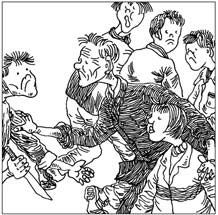|
A few days ago, a man in his 70s was knocked down and beaten by two thieves he was trying to stop on a street in Baoding, Hebei Province. Though many people witnessed the incident, none of them interceded on behalf of 74-year-old Zhao Zhendong. Eventually, three passersby who were roughly Zhao's age stepped in to fight the thugs and ultimately subdued them.
A similar case happened last month in Wuhan, Hubei Province.
Sixty-eight-year-old Deng Yingxian found two robbers trying to loot a pawnshop as a clerk lay on the ground bleeding. Deng rushed in to fight with them. One ran off and the other, wielding a bloodstained knife, slashed Deng's hand. However, Deng fought on without fear and wrested the knife from the burglar, who then ran off down the street. No passersby, not even the many young men around, tried to stop the criminal.
The five senior citizens involved in these accidents are all veteran Communist Party members, according to media reports. In both cases, younger men on the scene simply stood looking on.
I am not implying that all senior citizens are more noble-minded than the youth of today. There have been reports of young people fighting bravely to stop crime on the streets. But one cannot deny that in most cases, many people choose to avert their eyes when crimes occur. This environment makes the bravery of the aforementioned senior citizens stand out in greater relief.

In most such cases, old people hesitate to act because they are too weak to stop crime, but the only thing holding back younger people seems to be indifference.
Basically, I mean public ethics have deteriorated in our society. Except for a few exceptions, it is rare to see passersby rallying together to thwart street crime, which was common 20 or 30 years ago.
Admittedly, we have become more civilized after more than two decades of opening up to the outside world. We are more aware of human rights; we have learned to respect criminals' rights; and we have learned to put woolen knitwear on pet dogs in winter. Meanwhile, we have become blind to thieves snatching wallets from the people standing beside us on the bus and deaf to the cries for help that come from the shadows.
This apathy toward social evils is the result of a decline in moral education in schools and the encouragement of selfish individuality by the mass media and parents. Anyone who is not blind to facts and who is not biased will acknowledge this assumption.
Of course, we should not make it compulsory for members of the public to battle crimes on their own. That is the responsibility of the police, though their apparently soft approach to dealing with violent crime is partly to blame for the public's lack of desire to confront crime when they see it.
It is to be lamented when people lose that sense of injustice and indignation that should come naturally in the face of evil deeds.
We have to face up to the seriousness of the problem and pay more attention to fostering a sense of justice among the younger generations. In this regard, schools, parents, the media and the government all have work to do.
Another thing the government should do to prevent violent crimes is to compensate substantially those who are injured in fighting the criminals. There have been many reports in the past that some were so seriously wounded they were no longer able to work. The "compensation" they got from the government was not enough to even cover their medical expenses.
Email: liushinan@chinadaily.com.cn
(China Daily 11/07/2007 page10)
我要看更多專欄文章
|